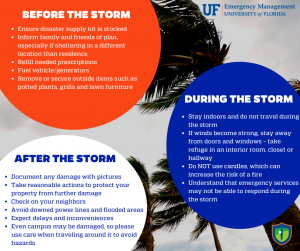Hurricanes and tropical storms are an inevitable part of living in Florida. Each year, hurricane season spans from June 1st to November 30th, with the most active storms being in mid-August and mid-October. Although no one can prevent these storms, preparation is key.
Before the Storm
Hurricane watches are typically issued 48 hours before onset of anticipated tropical storm-force winds. Hurricane warnings are issued 36 hours before tropical storm-force winds are expected. This critical time should be spent preparing for the storm.
Living in Florida, it is important to have a hurricane survival kit ready during the season. Stores often sell out of essential supplies in the hours before a hurricane is expected, so having a backup kit can help save time, money, and stress.
The following items should be in every hurricane kit:
- Water: 1 gallon per person/per day for at least 3 days (1/2 for drinking, 1/2 for sanitation).
- Shelf-stable food: store food that does not require refrigeration or preparation such as canned goods or shelf-stable meals (remember manual can opener).
- Battery-powered radio for storm updates.
- Flashlights.
- Batteries for a radio and flashlights.
- First aid supplies: check supply of nonprescription pain relievers, Band-Aids, antibacterial ointment, insect repellent, sunscreen and other items.
- Special needs items: prescription medications, baby formula and other items.
- Toiletries: hygiene items, hand sanitizer, paper towels, wipes.
- Important documents: Gator 1 card, insurance policies, drivers’ license, birth certificate, Social Security card, passport.
- Cash.
- Pet care items.
- USB Battery Charger.
In addition to gathering these items, you should also make a plan for where you are staying. Are you going to shelter in place, or travel to a different location? If you are sheltering somewhere different, let close family and friends know of your plans.
If you have a vehicle, make sure to fill up the gas tank before the storm hits and keep an emergency kit in the car. Include extra blankets, pillows, and bedding in this kit. Make sure to keep the vehicle under cover to protect it from storm damage. If you do not have a vehicle, consider staying with a friend or family member who has one in case of emergency.
Preparing your home for the storm is incredibly important. Outdoor belongings like plants, furniture, and grills should be stored out of the weather or secured in place to prevent damage. Covering up windows and doors with plywood can help keep you safe from shattered glass. Filling up tubs and sinks with water helps with washing and flushing in case you lose power in the storm.

If you live on-campus at UF, pay special attention to guidance from the Housing staff. When possible, food-service facilities will open in the residence areas. Housing units without food-services facilities will be given food if the emergency period lasts beyond 24 hours. Residents should have enough non-perishable food stored for the first 72 hours of an emergency. As UF is not responsible for personal belongings, renter’s insurance is advised to recover any damages.
During the Storm
Wherever you shelter, you should stay inside throughout the storm. If winds become too strong, keep away from doors and windows and take shelter in an interior room like a closet, hallway, or bathroom. Do not light candles as they are a fire hazard and emergency services may not be able to respond during the storm. Listen to updates on the storm to keep informed on curfew updates or water boil notices.
After the Storm
Hurricanes are damaging regardless of the category, and your home may be harmed. Go around your property and take photos of the damage for insurance purposes and take reasonable steps to prevent any further damage from occurring.
Make sure to check up on neighbors, especially the elderly. They may need help recovering from the storm, and it is always nice to lend a hand.
Although the storm is over, emergency services are still working overtime. Expect delays and inconveniences regarding power outages and store supplies. If travelling, avoid downed power lines and flooded areas.
Staying Safe and Informed
No one can stop a hurricane, but everyone can prepare for one. Whether you live on or off campus at UF, you can access these resources to help stay safe and informed this hurricane season.
- UF RUMOR CONTROL 866-UF FACTS (866-833-2287)
- UF POLICE DEPARTMENT 352-392-1111
- UF HOUSING & RESIDENCE EDUCATION 352-392-2161
- 352-392-5855
- ALACHUA COUNTY RUMOR CONTROL 311
- GRU (Gainesville Regional Utilities) POWER OUTAGES/DOWNED POWER LINES 352-334-2871
- UF FACILITY SERVICES EMERGENCY WORK REQUEST 352-392-1121
